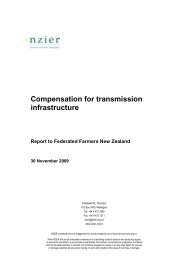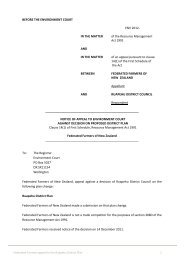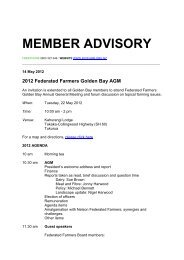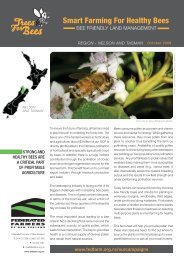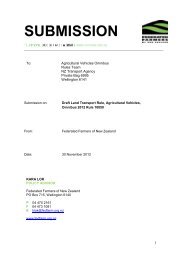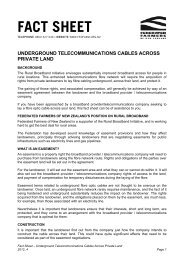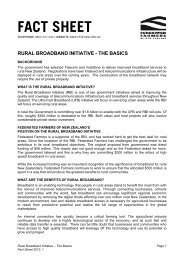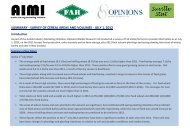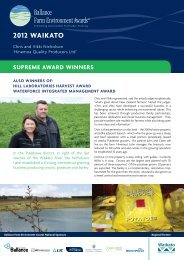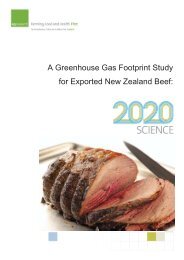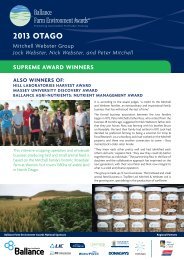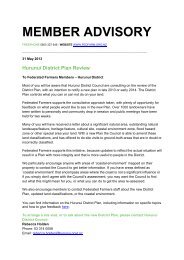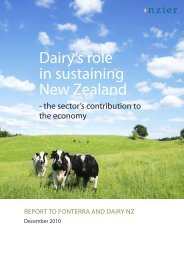Hearing Evidence – Brunner - Federated Farmers
Hearing Evidence – Brunner - Federated Farmers
Hearing Evidence – Brunner - Federated Farmers
Create successful ePaper yourself
Turn your PDF publications into a flip-book with our unique Google optimized e-Paper software.
62. In our submission on Policy 9.3.7, discussed at Decision Requested: 9.38, <strong>Federated</strong><br />
<strong>Farmers</strong> requested an amendment to the explanation to make it clear that the policy is<br />
non-compulsory in nature. The 42A report recommended Council reject this<br />
submission. We maintain that conventional wintering in the catchment may be the only<br />
practicable option for many, for example if market conditions result in shortage of land<br />
for winter grazing elsewhere, or biosecurity issues, (such as Tb) restrict stock<br />
movements.<br />
63. In further submissions, <strong>Federated</strong> <strong>Farmers</strong> responded the submission of the<br />
Department of Conservation (at Decision Requested: 9.37), who sought Rules to<br />
manage winter grazing. <strong>Federated</strong> <strong>Farmers</strong> members fear that ‘rules’ for winter grazing<br />
will result in excessive cost in light of the nature of the problem and concessions<br />
already made by farmers in the <strong>Brunner</strong> catchment. An obvious fear is that rules will<br />
involve requirements for ‘alternative’ wintering practices, such as wintering barns, to<br />
demonstrate reduced phosphorous loss. <strong>Federated</strong> <strong>Farmers</strong> seeks to avoid this<br />
outcome because wintering barns are very costly, and introduce technical complexity<br />
around animal welfare and diet which must be carefully managed. Furthermore,<br />
wintering barns encourage high intensity farming as farmers attempt to recover the<br />
cost, and take advantage of the ability of wintering barns to achieve efficient feed<br />
utilisation, and increase cow numbers on the milking platform. With future policy<br />
responses to stock wintering, the Council is better to avoid prescriptive policy<br />
responses, and focus on good wintering practice, and to ensure that solutions are cost<br />
effective and achieve good environmental outcomes.<br />
4. Other Matters<br />
4.1 Policy 4.3.6 <strong>–</strong> Council will require the use of bridges, culverts, and other<br />
methods where a farmers causes a herd of cattle to cross any river or<br />
permanently flowing creek, at any farm raceway, more than ten times in any<br />
month for herds larger than 500 cattle, or more than 20 times in any month for<br />
herds less than 500 cattle. A crossing is one-way only.<br />
This Policy also applies for dry stock where more than 50 animals cross any<br />
river or permanently flowing creek more than 20 times per month.<br />
63. <strong>Federated</strong> <strong>Farmers</strong> are pleased to see the recommendation to accept our submission<br />
and amend Policy 4.3.6 at Decision Requested: 4.17 of the 42A report. The suggested<br />
changes make sense and make the plan more coherent and easier to understand, and<br />
are fairer because cattle are treated equally with other stock types.<br />
64. <strong>Federated</strong> <strong>Farmers</strong> made further submissions on the submission from Fish and Game<br />
discussed at Decision Requested 4.18. This submission includes a request to extend<br />
controls on stock crossings to any situation where a farmer causes cattle to cross a<br />
‘river or permanently flowing creek’. In response to the submission of Fish and Game, it<br />
is not reasonable or efficient to require that every place where animals might<br />
conceivably cross a stream has a fence or a culvert. We support the 42A report which<br />
recommends the Council reject this submission.<br />
14



